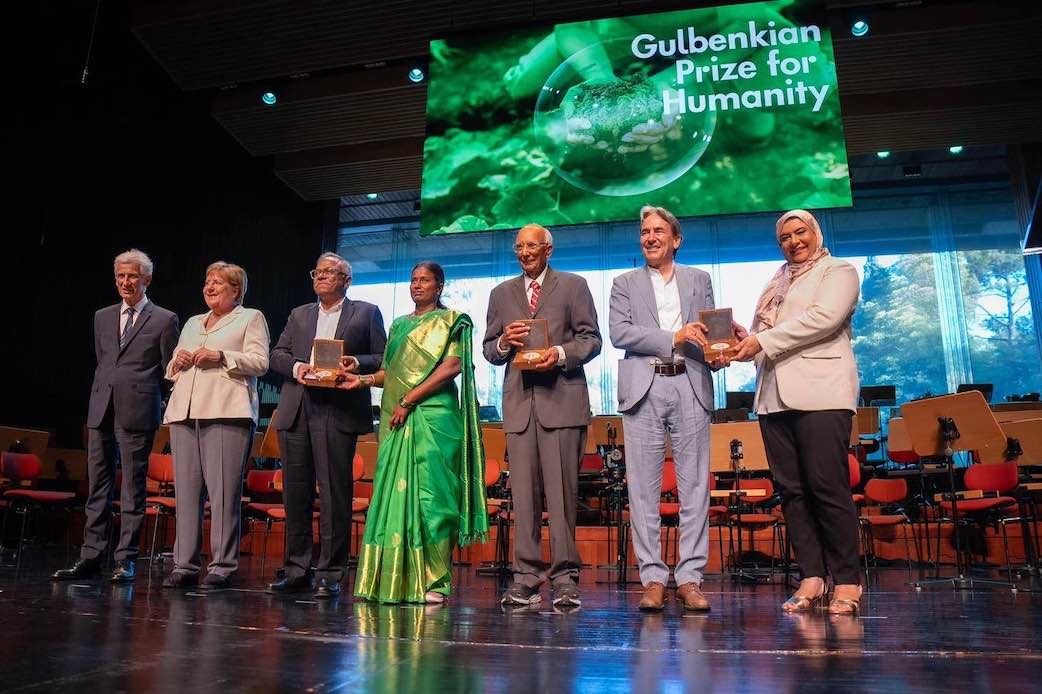Three visionary sustainable agriculture pioneers have been announced by the Calouste Gulbenkian Foundation as winners of the 2024 Gulbenkian Prize for Humanity, in recognition of their substantial contribution to global food security, climate resilience and ecosystem protection: Andhra Pradesh Community Managed Natural Farming (India), a state-wide programme supporting smallholders, predominantly women, switch to natural farming; Rattan Lal (USA/India), a scientist who pioneered a soil-centric approach to agriculture; and SEKEM (Egypt), in recognition of its sustainable agriculture work, in particular its flagship initiative the Egyptian Biodynamic Association – a network enabling farmers to transition to regenerative practices.
The Jury, chaired by Dr Angela Merkel, selected the three recipients out of 181 nominations with nominees from 117 nationalities – the most Prize nominations received and from more geographies than ever before. The winners were chosen for their varying approaches to sustainable agriculture including biodynamic, natural and regenerative farming which have been proven in different geographical regions with challenging climatic conditions. They demonstrate how sustainable agriculture benefits communities, farmers, economies and the planet.
The 2024 Prize highlights how climate-related challenges are interlinked and lead to interconnected systemic crises. Climate change is exacerbating biodiversity loss, extreme weather, and resource degradation, disrupting food systems and human health globally. Simultaneously, agriculture significantly contributes to climate change through carbon emissions, land and water degradation, and biodiversity loss.
The Andhra Pradesh Community Managed Natural Farming (APCNF) supports smallholder farmers to switch from chemically intensive agriculture to ‘natural farming’, through practices such as using organic residues and minimising tillage to improve soil health; reintroducing indigenous seeds; and diversifying crops, including trees. It was launched in 2016 by the Government of Andhra Pradesh, aiming to find a sustainable solution to farmer distress caused by economic crises in agriculture and climate change.
Implemented by non-profit organisation Rythu Sadhikara Samstha (RySS) (‘Farmers Empowerment Cooperation’), it is recognised as the world’s largest agroecology programme, now reaching over a million smallholder farmers, predominantly women, across 500,000 hectares in the state. The programme offers farmers increased yields, improved incomes and improved health benefits from the first season of transition. It has also generated environmental and social benefits including greater soil carbon sequestration, reversed land degradation, reduced soil temperatures, increased biodiversity. Its success relies on four levers: delivery through an established network of women collectives; farmer-to-farmer learning via ‘Champion Farmers’; progressive technology; and government ownership.
The programme aims to reach all eight million farmer households in Andhra Pradesh over the next 10 years and inspire replication elsewhere. The model is already being incubated across 12 states in India, and in 2024 will be introduced in five other Global South countries, adapted to local contexts.
Dr Rattan Lal is a globally renowned soil scientist. He pioneered a soil-centric approach that harmonises food production with ecological preservation and climate change mitigation. His methodologies have highlighted on a global stage the interconnectedness of soil health and broader environmental and human wellbeing, and the importance of enhancing food security while conserving natural resources. By promoting research and education in sustainable soil management, Dr Lal has advanced understanding of sustainable agriculture and climate resilience.
SEKEM is a conglomerate of NGOs and businesses championing holistic approaches to tackle climate change. Established almost 50 years ago in a desert region, SEKEM’s inception was rooted in biodynamic farming – rejuvenating arid land and local society. Its food and agriculture work scales up regenerative practices and highlights the co-benefits of nature-based solutions for land and communities. SEKEM’s key initiative, the Egyptian Biodynamic Association (EBDA), is Egypt’s largest independent farmers’ association and is enabling farmers to transition from conventional to regenerative farming models while supporting rural development. To date, it has supported over 5,000 farmers and converted over 12,000 hectares of land.


